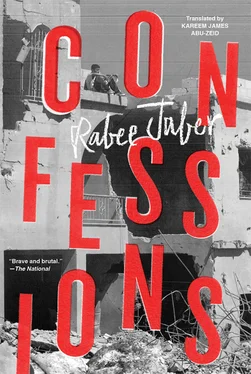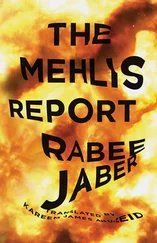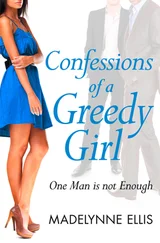How accurate are my memories? Remembering is difficult, you can’t imagine how difficult this is for me. I remember myself and I don’t. It’s like I’m remembering a life someone else has lived. Strange, this feeling. And at the same time not strange at all. Listen: In the first days of winter, when the cold sets in and the rains begin to fall, I always feel a pain in my chest. Every year, every single year. Often the pain in my chest is so sharp that I have to gasp for air. What do these small things reveal?
When I started college in West Beirut — after the end of the war in 1990—I thought I was entering dangerous territory. I was careful about what I said, and I noticed that I, like my father, didn’t like to talk much. I didn’t realize this until after I started college. I began thinking about my father a lot back then, and tried to understand him — but how can you understand someone who never stops building walls around himself? I have pictures and countless memories of my father. Sometimes these memories suffocate me. But it’s Ilya’s memories of him that suffocate me even more — and also my sisters’ memories of him, and especially memories from early on in the war, especially those memories.
He used to disappear from the house for days and nights on end. There wasn’t a single person in the entire Sioufi district who didn’t know what he was up to — half the makeshift roadblocks at the crossings were of his doing. He had certain companions who never left his side, even for a moment. His reputation kept growing, until they came to know his name over there, on the other side of the demarcation line — that’s what Ilya said. Was he exaggerating? If he wasn’t exaggerating, if all of that was true, if… Listen: All of this is exhausting, I’ll keep it as short as I can.
He kidnapped families and killed them. He kidnapped them on al-Sham Road, he kidnapped them at al-Burj Square, he kidnapped them behind the Lazariyyah Complex, and at the Museum, and at Bechara al-Khoury. He kidnapped them at Sodeco Square, at the al-Sayyad circle, by the Monteverde district, he kidnapped them on the bridge in Jisr al-Basha…. He went all over the place, everywhere, kidnapping and killing, kidnapping and killing. Years later, Ilya stopped me behind the Collège des Frères in Gemmayze and showed me some bullet holes in one of the walls. “We used to gun them down right here,” he said.
How many years have passed since the Two-Year War? Thirty-two? Thirty-three? As I speak now, I feel as if I’m more than one person: there’s someone inside me who wants to talk and talk and talk, and there’s someone else inside me who wants me to shut up, to shut up forever, to never open my mouth again.
My father used to kidnap people and kill them. In one of the narrow streets by al-Burj Square, in one of those alleys not far from the square, he stopped a white car and asked the passengers for their papers. Two men were up front, and a woman was in the back with some children. The driver was shaking — he was terrified. How had he come here? Had he entered the alley by mistake? Lost his way? Had the car brought him here of its own accord? He was terrified. And so was the passenger in the front seat. Was the woman in the back his wife? And the children… three or four children, who were they?
My father wasn’t alone. He was the leader of the group. Something happened — maybe nothing happened, maybe that’s how it always went down — and they opened fire on the car. The car was stopped: the road had been blocked off with barrels and with my father’s car. Where could that family go? They opened fire on the car. It was raining. A light drizzle had been falling all that day, and my father and the men with him were wearing raincoats. Maybe the driver had lost his way because of the rain, because the car had a broken wiper, because he was afraid of deserted spaces. There were stores and offices in the square, and restaurants and parking lots, buildings and theaters. But this place, this alley near the square, was deserted. This was by the demarcation line. The frightened man had lost his way, the car came to a roadblock, and men in raincoats emerged from the shadows and opened fire on the people in the car.
The woman in the back held onto the children as the broken glass rained down on her. She held onto the children while the bullets spilled blood from her body. One of the armed men opened the door to the backseat to fire from close range. A little boy jumped out. He was four or five years old, blond, and fair-skinned. He was crying convulsively (warm blood was streaming from his body), he looked like he’d just woken up: that look was on his face, the look of a boy who’d been woken unwillingly from sleep.
He was wearing a white wool sweater. Blood seeped from its collar, and the stain kept on growing until it covered his whole chest. My father saw him and drew nearer to look at him. He motioned his friend away (the machine gun was still warm) and picked up the boy, who had fallen over. He wrapped the boy in a blanket and took him away.
The doctor said the boy would die from the bleeding. But still they gave him bag after bag of blood. And they removed the bullets and shards of glass from his body. The doctor said the boy would die, and asked my father where he’d found him — the doctor knew my father — we found him on the street, my father said.
The doctor said he’d die. But the boy didn’t die. His wounds became infected; his fever rose. They thought there was no hope for him. But he didn’t die. When he was finally better, when he opened his eyes to find himself lying on a bed in a house and not in a hospital, he didn’t open his mouth. He opened his eyes and looked at the faces that were looking at him. He heard words coming from a distance, but didn’t understand what he was seeing and hearing. Did they ask him what his name was then? Maybe no one asked him. He was four or five years old, and had come back from death. He was cured, and my father named him Maroun.
— He named him after you?
No. I’m Maroun. I’m the boy they kidnapped.
I’M MAROUN. I’m the boy they kidnapped. Didn’t I tell you I wasn’t myself? Didn’t I tell you my whole life has been strange, didn’t I tell you that I’ve always struggled with my memory, that my memory ran circles around me and twice deceived me? Dreams brought back images, and those memories perplexed me, it was like walking through a forest at night: what you remember overpowers you, it beats you down into the earth again and again, walking all over you, coming and going, paying you no heed, and leaving you lying on the ground with no way of grasping what you’ve remembered (where did this dark memory come from?) or how you remembered it. You might recall, for example, what I told you about us sitting down for a meal, how we ate warm kishk porridge around the table, how my father passed the bread to my big brother…. Do you remember that? When I went to college and lived in a dorm, when I moved away from our house in Achrafieh, I began having incomprehensible dreams. I’d had them before, or ones like them, but this time it was different — I felt that something was changing inside me…. How can I describe it? It’s better to tell you things in order, better to go back and tell you everything from the beginning.
They shot me in 1976, on the demarcation line that split Beirut in two, and my father picked me up and took me to his home. Rabee, if you ever write about my life one day, I want you to begin with that sentence: They shot me in 1976, on the demarcation line that split Beirut in two, and my father picked me up and took me to his home.
But he isn’t my father. I know that now. And at the same time, he really is my father. A light rain fell all day, and on that day I was given a new life. I lost one life and gained another…. Gained? And the other people they killed in the car? Do you think I don’t care? Do you think I didn’t look for my family when I found out? Don’t judge me until you’ve heard my story. I’m only at the beginning.
Читать дальше












